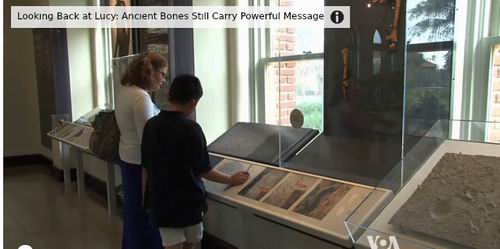VOA慢速英语: 研究者想起露西骨架的发现
 |
|
This year marks the 40th anniversary of the discovery of the early human skeleton named Lucy. |
It has been more than 40 years since the discovery of the early human skeleton named Lucy. The old bones were found in Ethiopia. Lucy is one of the most famous finds of the 20th century. She helped researchers better understand the history of human beings.
The famous skeleton has since left Africa and is now at the Natural History Museum of Los Angeles County in California. Researcher Don Johanson recently visited the museum. He discovered Lucy 40 years ago. He says the knowledge found in old bones is still relevant today.
"There is a single common origin for humanity. No matter the shape of our eyes, no matter the color of our skin, no matter the shape of our hair, no matter what kind of culture we live in, we all carry those same genes in our body. We are united by our past. We are united by this common beginning."
In 1974, Don Johanson found 40 percent of Lucy's skeleton – two fifths of all the bones in her body. At 3.2 million years old, she was the oldest human ancestor found at the time.
"Lucy while she was found so many years ago, still remains terribly important for understanding our earliest beginnings and occupies a very important place on the human family tree as a bridge between more ape-like and more human-like creatures."
Don Johanson says Lucy was just over one meter tall, with a small brain and an ape-like face. She had long arms and short legs. She also possessed an important human quality: the ability to walk in a upright, standing position.
Don Johanson says finding Lucy truly influenced the field of paleoanthropology.
He adds that the idea that humans came from Africa is a relatively recent one.
"Through much of the 20th century, there was this very Eurocentric view that we all evolved in Europe that that was the finishing school for humanity, but now there's almost complete consensus among scholars who study human origins that Africa was the place, just as Darwin had predicted way back in the middle 1800s."
Discoveries such as Lucy have led scholars to understand the common origins of all human beings. It also shows the unique, or special, qualities of modern humans.
Humans have a complex brain, language and culture. Don Johanson says these qualities enable humans to develop and overcome the environmental changes that have happened and will continue to happen over time.
I'm Marsha James.
Reporter Elizabeth Lee in Los Angeles prepared this story. Marsha James wrote it for Learning English. George Grow was the editor.
_____________________________________________________________
Words in this Story
relevant - adj., relating to a subject in the right or correct way
origin – n., the point or place where something begins or is created
paleoanthropology – n., the study of origins and ancient humans and their primate relatives chiefly by examining fossils and other human remains
scholar(s) - n. a person who has studied a subject for a long time and knows a lot about it
- 频道推荐
- |
- 全站推荐
- 推荐下载
- 网站推荐




















